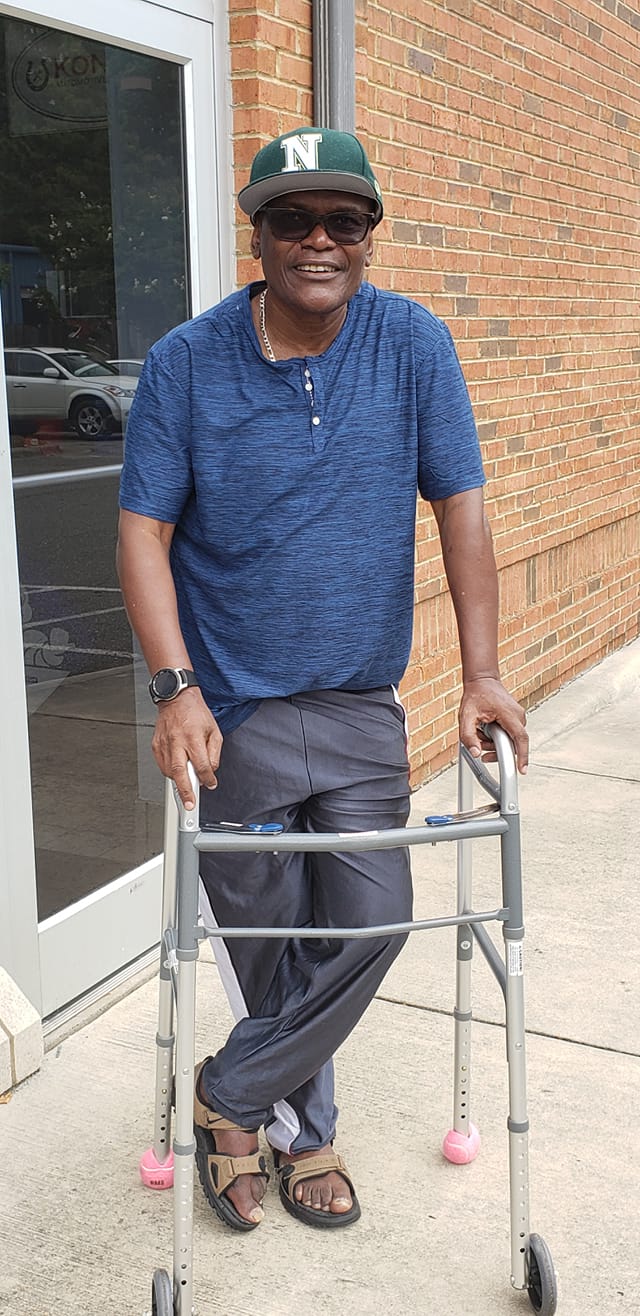After an experimental antibiotic for a drug-resistant infection in his leg, George Semakula is learning to walk on his own again.

After his mother’s funeral in Moshi, Tanzania, George Semakula, 57, took a walk around the village where he grew up before flying home to Durham, North Carolina. During his walk, George was mugged, pushed into a ditch and broke his left ankle so badly that the bone protruded. He was treated locally for 10 days, flown back to the United States and had surgery at Duke University Hospital in Durham. There, doctors scraped infected flesh from the wound and fixed his bone using pins and plates. They also determined the wound was infected with three types of bacteria, and one – Acinetobacter baumanii – was resistant to virtually every commercially available antibiotic.
“The infection was spreading fast, and they said if they couldn’t stop it, they would have to amputate my leg,” said George, 57, who is an independent truck driver.
“I have a medical background but I never imagined that there would be an infection that was so resistant,” said Miriam, George’s wife. “We kept our hopes high, but in the back of our minds we knew amputation was a possibility, which was pretty scary.”
The infectious diseases specialists who treated George searched worldwide and finally found an antibiotic that worked – cefiderocol, a Japanese experimental drug not yet approved by the FDA. Because the drug wasn’t commercially available, a “compassionate use” approval had to be secured from the FDA. George received three intravenous infusion (IV) of cefiderocol every day for four months.
Today, after six surgeries, a muscle flap, fixation of his fracture with an orthopedic plate, and four months of antibiotics, there is no sign of the infection and George is healing well. Originally confined to a bed, he graduated to a wheelchair and now is using a walker, mostly for balance. He is no longer taking any medications, is doing physical therapy twice a week to strengthen his ankle and walks for at least 20 minutes every day to build his endurance.
“The antibiotic really worked, the infection is gone and the healing is going well,” said George. “Now I can cook, do laundry, and Miriam and I go out to dinner and parties. I’m anxious to get back to work, hopefully in a few months.”
George was fortunate. With infections caused by aggressive and highly resistant bacteria such as Acinetobacter, there are no guarantees of such a good outcome, notes the infectious diseases specialist Dr. Vance Fowler, MHS, professor of medicine at Duke University School of Medicine, Durham, who treats George.
“Without the antibiotic from Japan, it would have been almost impossible to treat Mr. Semakula,” said Dr. Fowler. “He would have lost his leg, and possibly his life if the bug had entered his blood stream. When your best outcome is to lose your leg, that’s not great.”
He said George’s case and many others underscore the importance of supporting the development of new antibiotics. Increasingly, ID doctors are seeing infections that either untreatable or only treatable with antibiotics that come with major side effects.
“Infectious disease doctors are seeing infections such as these in the United States daily, some coming from exotic points of origin, but many homegrown,” said Dr. Fowler. “Staying a step ahead of these infections requires a multi-pronged solution, including careful stewardship of our remaining antibiotics resources and providing incentives to pharmaceutical companies to be sure they stay active in antibiotic development.”
While providing incentives to drug companies is controversial, the problem is that antibacterial development currently is on life support, he notes. Since 2017, six companies have abandoned antibacterial development or declared bankruptcy, and two other companies have announced massive layoffs.
“As Mr. Semakula’s case shows, antibiotics underpin modern medicine, and the fact is we desperately need new ones,” Dr. Fowler said.

